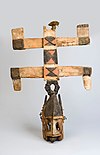Zulu traditional religion
This article has multiple issues. Please help improve it or discuss these issues on the talk page. (Learn how and when to remove these messages)
|
| Part of a series on |
| Traditional African religions |
|---|
 |
Zulu traditional religion consists of the beliefs and spiritual practices of the Zulu people of southern Africa. It contains numerous deities commonly associated with animals or general classes of natural phenomena. Unkulunkulu is known to be the Supreme Creator.
Beliefs
[edit]The Creator and the ancestors
[edit]Similar to other Bantu religions, adherents of Zulu traditional religion believe in honoring ancestors (Amadlozi) and in a multitude of gods. These beliefs are passed down orally through stories across generations. While the details of these stories may vary, they generally share the same themes, such as that the human world and the spirit world are interconnected, with divination practices used to bridge these realms.[1] The roles and relationship of the sky god Umvelinqangi and Unkulunkulu, the highest god and creator of humanity, often change depending on the version of the story.[1]
UmkhuluwoMkhulu ("the greatest one") was created in Uhlanga,[2] a huge swamp of reeds, before he came to Earth. Individuals base their morality or behavior ethics on his judgment or “apprehension of the Ultimate Reality.”
[3] Unkulunkulu is sometimes conflated with the sky god Umvelinqangi[4] (meaning "he who was in the very beginning"), the god of thunder, earthquake whose other name is Unsondo, and is the son of Unkulunkulu, the Father, and Nomkhubulwane, the Mother.[citation needed]
The word nomkhubulwane means the one who shapeshifts into any form of an animal. Another name given for the supreme being Umkhuluwomkhulu is uSomandla, the ultimate source of all existence. European settlers used the word Unkulunkulu in order to try to explain their belief in the God of the bible to the people of Zululand.[citation needed]
According to Irvin Hexham (1981), "there is no evidence of belief in a heavenly deity or sky god in Zulu religion before the advent of Europeans".[5] However, other scholars such as Eileen Jensen Krige, Isaac Schapera, Axel-Ivar Berglund (1976), Hammond-Took, and John Mbiti disagree with Hexham's analysis. They argue that the "lord of heaven" or Zulu sky god has always existed in the traditional Zulu belief system, a deity who they argue is greater than the "archetypal ancestor and creator, Unkulunkulu".[6]
Other deities
[edit]- Nomhoyi/Mamlambo, the goddess of rivers
- Nomkhubulwane/Mbaba Mwana Waresa, sometimes called the Zulu Demeter, who is a goddess of the rainbow, agriculture, rain and beer (which she invented)
- Inkosazana, another fertility goddess
- uNgungi, the deity of the blacksmiths
- iNyanga the Moon goddess is associated with healers who are called IziNyanga, the word nyanga is a Zulu word for the Moon
- Sonzwaphi the deity of healing
- Ukhulukhulwana (or UkhuluKhukwan) a star being ancestor who came from the stars and found the ancient Zulus living like animals and without laws. He taught them to build huts and taught them the high laws of isiNtu. The word unkulunkulu is suspected to be a corruption of the word umkhuluwomkhulu. [citation needed]
See also
[edit]Notes and references
[edit]- ^ a b Thomas, Douglas; Alanamu, Temilola, eds. (2019). African religions: beliefs and practices through history. Santa Barbara: ABC-CLIO. ISBN 978-1-61069-752-1.
- ^ Callaway, Henry, The Religious System of the Amazulu ... in Their Own Words, J. A. Blair (1868), p. 57-8 [1] (Retrieved 11 July 2019)
- ^ Mafuta, Willy L.; Kaunda, Chammah J. (2021-05-04). "Recovering African Religions as "World Religions": The Case of the Zulu Religion". Black Theology. 19 (2): 122–134. doi:10.1080/14769948.2021.1955179. ISSN 1476-9948.
- ^ Callaway, Henry (1868) [in] Umkhuluwomkhulu: The tradition of creation as existing among the Amazulu and other tribes of South Africa, in their own words, Volume 1, (1868), pp. 41-3 [2] (Retrieved 11 July 2019)
- ^ *Hexham , Irvin ((1981), Lord of the Sky-King of the earth: Zulu Traditional Religion and Belief in the Sky God, Sciences Religieuses Studies in Religion, vol. 10: 273-78)
- ^ Chidester, David; Kwenda, Chirevo; Petty, Robert ; Tobler, Judy; and Wratten, Darrel; African Traditional Religion in South Africa: An Annotated Bibliography: An Annotated Bibliography, ABC-CLIO (1997), p. 246, ISBN 9780313032257 [3] (Retrieved 11 July 2019)
- Lynch, Patricia Ann; Roberts, Jeremy (2010). African Mythology, A to Z. Infobase Publishing. p. 138.
Further reading
[edit]- Hexham, Irvin, ((1981) Lord of the Sky-King of the earth: Zulu Traditional Religion and Belief in the Sky God, Sciences Religieuses Studies in Religion, vol. 10: 273–78)
- Berglund, Axel-Ivar, (1976) Zulu Thought-Patterns and Symbolism, London: C. Hurst
- John S. Mbiti, African Religions and Philosophy. African Writers Series. Heinemann [1969] (1990). ISBN 0-435-89591-5
- Werner, Alice, Myths and Legends of the Bantu, Library of Alexandria (1968)

